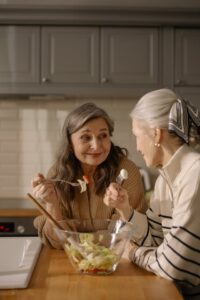Alex Lehto-Clark, a transman living in the upper peninsula of Michigan, celebrates Christmas with Christmas cookies, charcuterie boards, holiday tunes, and something extra: an outfit swap. As his queer chosen family joins for the festivities, they each go to the basement, leaf through bundles of clothes, change in makeshift fitting rooms, and debut their new looks. Outside, they might be rejected or scorned for choosing clothes that align best with who they are, but here, they are told they are beautiful.
The clothing swap reveals something vital about chosen family. For some queer people, family of origin is a place where their parents’ sense of identity is contingent on them collapsing their own—to be straight or cisgender. Family of origin means emotional drag: authenticity or connection, while chosen family offers authenticity and connection.
Alex came from a Catholic family of origin “obsessed with the idea of normal.” Though they came around, they didn’t accept his sexuality or gender at first. But with his chosen family, “I can talk about sex and trauma and all the shitty little microaggressions trans people go through.” Discussing his mental health issues with his family of origin felt taboo. Yet, when Alex told his friend Aiden “I feel like I’m going crazy,” after mental health challenges, Aiden responded “you don’t have to be sane for us to love you.”
Emotional needs, like Alex’s, can drive a search for chosen family, but so can material. The term, coined by Kath Weston in Families We Choose (additional terms that challenge traditional notions of family include relationship anarchy, polyamory, platonic life partners, and polycule), arose in part, because of queer people’s need for caretakers, unfulfilled by estranged family, during the AIDS epidemic. Now, given 9% of LGBT are fired or not hired because of their identity, and transgender people are twice as likely to be unemployed, queer people may seek chosen family to access resources.
Queer people embracing chosen family demonstrate there is no extraordinary love reserved for family. Anyone can lug us to the airport, shovel our cars from snow, fulfill our prescriptions, or top off our rent. When family reject queer people, it becomes obvious that the concept of family is, as Kath Weston frames it, a social construct. Norms like unconditional love and lifelong commitment are not given but contested. Nor must they be exclusively impressed on families of origin. We can extract, a la carte, functions we like best from “family” and apply these to chosen family.
That is—if we’re allowed into one.
Caleb Luna, the nonbinary author of Revenge Body sees being fat and “culturally ugly” as barring them from masc community. A desire for sex and intimacy are so ensnared in masc spaces, Caleb argues,—citing Foucault’s point that to be gay means wanting not just sex but intimacy with men— that the culturally ugly cannot access intimacy in any form: “if you’re having sex with your friends, then you’re also only being friends with people you want to have sex with.” They ask themselves if someone finds them attractive to discern “will this person let themselves care for me? Are they someone who will allow themselves to prioritize me when necessary? ..to invest in me and do the work to keep our relationship positive and mutually beneficial?”
Still, Caleb wants chosen family to find healthier relationships. In their family of origin, their mother insisted they conceal their queerness, lose weight, and devote their life to Jesus. For a chosen family, Caleb sees commitment as nested in more nourishing anchors than blood or legal documents. “Because of the chosen part, it breeds accountability. You have to be committed to a certain level of treatment with one another.”
For Wil, who identifies as agender, and considers their chosen family their romantic partners and friends, the anchor of chosen family is love, support, and care. “There isn’t a fear mongering permeance—you’re stuck with me so I can do anything to you—but a dedication to being with each other for as long as we’re healthy and happy…and taking into consideration every single members’ experiences and lives and identity and humanity.”
For people struggling with their family of origin, the concept of chosen family offers solace. It reveals that for every loss there is an offering—for every vacuum in connection, there is spaciousness for something new. And even though chosen families may be exclusive or hard won from trauma, when done well, they can offer a profound joy that surpasses what many know in their family of origin. Because when our ideas of family stretch, we can explore and pursue with chosen family what we truly want from the closest relationships of our lives.
In Wil’s words, “Being able to look at my family and say we broke all the rules and we’re happy and healthy and functioning shows me that in all other aspects of life, that could be true too. Things don’t have to be better through the systems that currently exist. There’s more out there for us. We could be living better. We really could. We just have to try.”
The author thanks Drs. Skyler Jackson and Bri Farber for their feedback on content in this article.




